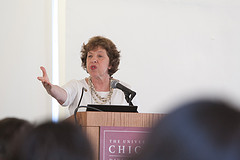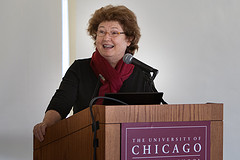Bertha Becker
Geógrafa, Professora Emérita, UFRJ - Rio de Janeiro, RJ
Science and Technology in face of the current proposals for the development of the Amazon
As a result of unique historical and geographical conditions, the Amazon is still not fully integrated and developed. In fact, these conditions explain why the region is the focus of multiple conflicting interests. In our time, the world has changed quickly and unpredictably, which makes it impossible for science to change at the same pace. However, we still demand that scientific knowledge identify, with clarity, the implicit and explicit projects that are at stake for the region. As a result, we expect science to inform societal change and political decision making in the Amazon.
In this paper, I propose a project that coincides with the goal we attribute to science, and prevents the vicissitudes of other broad projects developed for the region. Unfortunately, such projects bring significant collateral damage to the region. The first of these projects, for instance, advocates that we should keep the current dynamic in the Amazon, inserting it into the global market through mineral and lumber primary extractive practices, and through capitalized, but not industrialized, husbandry. However, husbandry is responsible for the expropriation of traditional and agrarian populations.
On the other side of the spectrum, global proposals for the preservation of tropical forest suggest the use of direct finance to avoid deforestation, as well as the sale of carbon quotas. Although appealing, this proposal is no solution to the regional development because it does not favor local populations in any way: resources would be enjoyed only by major proprietors and, above all, forest areas would be immobilized by productive isolation, therefore generating no income or employment.
Here, I propose changes in the current development standard, in order to produce without destroying. Such changes would generate wealth, employment and income, through a scientific and technological revolution beyond innovation in products and processes. Moreover, these changes would, by necessity, promote the institutional reorganization, and would respect socio-environmental diversity. This proposal demands that scientists participate actively in the organization of markets for natural products and services, as well as in the construction of a National Project for the region.
Download: Paper (PDF) | Slides (PPT)
Bertha K. Becker is Emeritus Professor at Universidade Federal do Rio de Janeiro, where she has coordeninated the “Laboratório de Gestão do Território.” She holds a Bachalor’s degree in Geography and History (Universidade do Brasil), and was a visiting scholar at the Department of Urban Studies and Planning of the Massachutes Institut of Technology. She is a senior researcher at CNPq e Dr. Honoris Causa by Universite de Lyon III. Her main research area is Political Geography of Brazil, especially of the Amazon. She has been vice-president of the International Geographic Union, and has advocated several environmental causes in France and Mexico. She has been a member of the International Consulting Pilot Group for the Protection of Brazilian Tropical Forests, and has served as a consultant for the Ministries of National Integration, of Science and Technology, and of the Environment. Professor Becker has published a number of books and articles. The American Geographical Society has awarded her the David Livingstone Centenary Medal. She has also received honors from FAPERJ (Carlos Chags Filho Medal), and from the Brazilian government (Ordem Nacional do Mérito Científico e a Ordem de Rio Branco).




